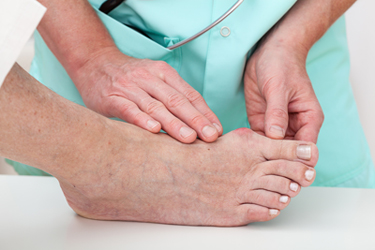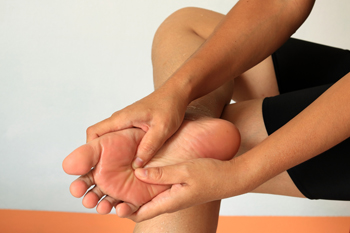Items filtered by date: May 2020
Heel Pain Can Be Treated!
Medical Conditions Can Lead to Foot Pain
Pain in one or more areas of the feet is a common condition many people contend with. Foot pain can come from breaking your foot or toe, or from medical conditions that can include gout, plantar fasciitis, bunions, and blisters. Patients who are overweight can have foot pain as a result of the added weight the feet have to endure. Diabetic patients are susceptible to ulcers developing on the feet, and this may cause mild to severe pain. Foot pain that develops gradually can come from wearing shoes that do not fit correctly. Conditions that may develop from this can include bunions, hammertoes, and ingrown toenails. If you are experiencing any type of foot pain, it is strongly suggested that you are under the care of a podiatrist.
Foot Pain
Foot pain can be extremely painful and debilitating. If you have a foot pain, consult with Dr. Joshua David Scoll from Pennsylvania. Our doctor will assess your condition and provide you with quality foot and ankle treatment.
Causes
Foot pain is a very broad condition that could be caused by one or more ailments. The most common include:
- Bunions
- Hammertoes
- Plantar Fasciitis
- Bone Spurs
- Corns
- Tarsal Tunnel Syndrome
- Ingrown Toenails
- Arthritis (such as Gout, Rheumatoid, and Osteoarthritis)
- Flat Feet
- Injury (from stress fractures, broken toe, foot, ankle, Achilles tendon ruptures, and sprains)
- And more
Diagnosis
To figure out the cause of foot pain, podiatrists utilize several different methods. This can range from simple visual inspections and sensation tests to X-rays and MRI scans. Prior medical history, family medical history, and any recent physical traumatic events will all be taken into consideration for a proper diagnosis.
Treatment
Treatment depends upon the cause of the foot pain. Whether it is resting, staying off the foot, or having surgery; podiatrists have a number of treatment options available for foot pain.
If you have any questions, please feel free to contact one of our offices located in Philadelphia, Bensalem, and Fairless Hills, PA . We offer the newest diagnostic and treatment technologies for all your foot care needs.
Are Bunions Hereditary?
 The place on the foot where bunions develop is the bottom of the big toe. Common symptoms that are present in larger bunions can consist of pain and swelling on and around the affected area, and skin that has become calloused on top of the bunion. Additionally, it may be difficult to wear shoes that are normally worn, and larger shoes may have to be purchased so the feet can feel comfortable. Patients who have developed bunions may have prior medical conditions that can include arthritis, cerebral palsy, in addition to genetics playing a significant role in developing a bunion. Mild relief may be found when custom-made orthotics are worn, and it may help to wear a protective pad over the bunion. If you have a bunion, and would like additional information about effective treatment options, please consult with a podiatrist.
The place on the foot where bunions develop is the bottom of the big toe. Common symptoms that are present in larger bunions can consist of pain and swelling on and around the affected area, and skin that has become calloused on top of the bunion. Additionally, it may be difficult to wear shoes that are normally worn, and larger shoes may have to be purchased so the feet can feel comfortable. Patients who have developed bunions may have prior medical conditions that can include arthritis, cerebral palsy, in addition to genetics playing a significant role in developing a bunion. Mild relief may be found when custom-made orthotics are worn, and it may help to wear a protective pad over the bunion. If you have a bunion, and would like additional information about effective treatment options, please consult with a podiatrist.
If you are suffering from bunions, contact Dr. Joshua David Scoll of Pennsylvania. Our doctor can provide the care you need to keep you pain-free and on your feet.
What Is a Bunion?
A bunion is formed of swollen tissue or an enlargement of boney growth, usually located at the base joint of the toe that connects to the foot. The swelling occurs due to the bones in the big toe shifting inward, which impacts the other toes of the foot. This causes the area around the base of the big toe to become inflamed and painful.
Why Do Bunions Form?
Genetics – Susceptibility to bunions are often hereditary
Stress on the feet – Poorly fitted and uncomfortable footwear that places stress on feet, such as heels, can worsen existing bunions
How Are Bunions Diagnosed?
Doctors often perform two tests – blood tests and x-rays – when trying to diagnose bunions, especially in the early stages of development. Blood tests help determine if the foot pain is being caused by something else, such as arthritis, while x-rays provide a clear picture of your bone structure to your doctor.
How Are Bunions Treated?
- Refrain from wearing heels or similar shoes that cause discomfort
- Select wider shoes that can provide more comfort and reduce pain
- Anti-inflammatory and pain management drugs
- Orthotics or foot inserts
- Surgery
If you have any questions, please feel free to contact one of our offices located in Philadelphia, Bensalem, and Fairless Hills, PA . We offer the newest diagnostic and treatment technologies for all your foot care needs.
Eating Healthy Foods May Help Swollen Feet
 Swollen feet is a condition many pregnant women battle with. This is a common foot ailment that can be a result of the growing baby, and thickened blood that can put pressure on the pelvis and feet. Additionally, specific hormones may cause the veins to become relaxed, and this may change the speed blood is moved throughout the body. It can be helpful to perform gentle foot stretches during the course of the day, which may alleviate a portion of the swelling. Research has indicated that staying hydrated by drinking plenty of water is important in reducing fluid that is stored in the tissues. This can also be achieved by eating healthy foods that can include asparagus, celery, watermelon, and other foods that can increase elimination of water. If you would like more information about how to reduce swelling in your feet, especially while you are pregnant, please speak with a podiatrist.
Swollen feet is a condition many pregnant women battle with. This is a common foot ailment that can be a result of the growing baby, and thickened blood that can put pressure on the pelvis and feet. Additionally, specific hormones may cause the veins to become relaxed, and this may change the speed blood is moved throughout the body. It can be helpful to perform gentle foot stretches during the course of the day, which may alleviate a portion of the swelling. Research has indicated that staying hydrated by drinking plenty of water is important in reducing fluid that is stored in the tissues. This can also be achieved by eating healthy foods that can include asparagus, celery, watermelon, and other foods that can increase elimination of water. If you would like more information about how to reduce swelling in your feet, especially while you are pregnant, please speak with a podiatrist.
Pregnant women with swollen feet can be treated with a variety of different methods that are readily available. For more information about other cures for swollen feet during pregnancy, consult with Dr. Joshua David Scoll from Pennsylvania. Our doctor will attend to all of your foot and ankle needs.
What Foot Problems Can Arise During Pregnancy?
One problem that can occur is overpronation, which occurs when the arch of the foot flattens and tends to roll inward. This can cause pain and discomfort in your heels while you’re walking or even just standing up, trying to support your baby.
Another problem is edema, or swelling in the extremities. This often affects the feet during pregnancy but tends to occur in the later stages.
How Can I Keep My Feet Healthy During Pregnancy?
- Wearing orthotics can provide extra support for the feet and help distribute weight evenly
- Minimize the amount of time spent walking barefoot
- Wear shoes with good arch support
- Wear shoes that allow for good circulation to the feet
- Elevate feet if you experience swelling
- Massage your feet
- Get regular, light exercise, such as walking, to promote blood circulation to the feet
If you have any questions please feel free to contact one of our offices located in Philadelphia, Bensalem, and Fairless Hills, PA . We offer the newest diagnostic and treatment technologies for all your foot and ankle needs.
How Do Gout Attacks Occur?
 Patients who experience gout are aware of the debilitating pain and discomfort this condition may cause. It affects the joints in the big toe, and is considered to be a form of arthritis. Gout can be caused for a variety of reasons. These can include genetic factors, eating foods that have elevated purine levels, or it may come from specific medical conditions. It occurs as a result of high uric acid levels in the blood. Patients have described the sensation of gout as crystals that form between the joints, and can cause severe pain and discomfort. There are methods that can be implemented which can possibly prevent future gout attacks. These can include losing excess weight, and avoiding foods consisting of red meat and seafood. Additionally, it is recommended that alcohol consumption is limited. If you are getting frequent gout attacks, it is suggested that you consult with a podiatrist as quickly as possible who can help you to manage and prevent this condition.
Patients who experience gout are aware of the debilitating pain and discomfort this condition may cause. It affects the joints in the big toe, and is considered to be a form of arthritis. Gout can be caused for a variety of reasons. These can include genetic factors, eating foods that have elevated purine levels, or it may come from specific medical conditions. It occurs as a result of high uric acid levels in the blood. Patients have described the sensation of gout as crystals that form between the joints, and can cause severe pain and discomfort. There are methods that can be implemented which can possibly prevent future gout attacks. These can include losing excess weight, and avoiding foods consisting of red meat and seafood. Additionally, it is recommended that alcohol consumption is limited. If you are getting frequent gout attacks, it is suggested that you consult with a podiatrist as quickly as possible who can help you to manage and prevent this condition.
Gout is a foot condition that requires certain treatment and care. If you are seeking treatment, contact Dr. Joshua David Scoll from Pennsylvania. Our doctor will treat your foot and ankle needs.
What Is Gout?
Gout is a type of arthritis caused by a buildup of uric acid in the bloodstream. It often develops in the foot, especially the big toe area, although it can manifest in other parts of the body as well. Gout can make walking and standing very painful and is especially common in diabetics and the obese.
People typically get gout because of a poor diet. Genetic predisposition is also a factor. The children of parents who have had gout frequently have a chance of developing it themselves.
Gout can easily be identified by redness and inflammation of the big toe and the surrounding areas of the foot. Other symptoms include extreme fatigue, joint pain, and running high fevers. Sometimes corticosteroid drugs can be prescribed to treat gout, but the best way to combat this disease is to get more exercise and eat a better diet.
If you have any questions please feel free to contact one of our offices located in Philadelphia, Bensalem, and Fairless Hills, PA . We offer the newest diagnostic and treatment technologies for all your foot and ankle needs.


